Last summer, quirky Netflix dramedy Atypical charmed its way into my heart with its witty writing and unprecedented depiction of life on the autism spectrum. There were plenty of people who did not like it, citing valid complaints about stereotypes and a lack of autistic people working on the show. Despite holding the same concerns, I couldn’t anything other than love Atypical. My affinity for family-centered dramedies along the lines of Juno, Little Miss Sunshine, and Dan in Real Life is probably somewhat to blame. But I also loved this family in particular. I immediately related to Sam, the autistic teenager who’s easily overwhelmed, bullied in school, and feels immense anxiety about change or anything unpredictable. Surprisingly, I related equally to his neurotypical sister. That would be Casey, the sensitive yet sarcastic jock overshadowed by her needy older sibling.
The Gardner family’s dynamics always felt very genuine, despite or perhaps because of the chaos of their lives. The depiction of Sam’s autism read really authentic, too. Amazingly so, considering Atypical had no autistic consultants in its first season. But in its recently released second season, the show upped its game on many levels. The creators rounded out the autistic representation in both perspective and casting. They also focused more on Casey and gave her a queer awakening storyline that somehow felt even more authentic than anything this show has ever done before. Quite the accomplishment.
What exactly is it about these facets of the show that I find so relatable, that feel so authentic? I’m glad you asked. Commencing infodump in 3, 2, 1…
The Autistic Experience
As I alluded to above, there were some issues with Atypical‘s autistic representation in season one. There’s bound to be hyperbole in comedy, but some autistic characteristics and/or stereotypes were exaggerated to unhealthy degrees. For instance, Sam falling for his therapist and breaking into her house, or telling Paige he didn’t love her in front of her whole family. Thankfully, that was dialled back this year. A change in Sam’s aspirations also improved his storyline and helped with the stereotyping problem. Sam’s goal in season two was achieving independence and preparing for the future, not finding a girlfriend. Thus, his storyline went from the tired ‘socially awkward guy seeks love’ trope to something more universally relatable to autistics.
Atypical also made a point of including a broader range of experiences this season, introducing a peer group for Sam. Even better, all those characters were played by actors who are actually autistic. The creators also brought on David Finch, an author and speaker who is on the spectrum, as a consultant. This was all at least partly in response to the backlash the show got after season one dropped. I must say, the fact that the creators listened to criticism from the community they were trying to represent and took active steps to improve it impresses me. It’s sad that that’s an abnormal gesture, but it kind of is. And it makes me feel a lot better about a show that at times felt like neurotypicals making fun of autistic people.
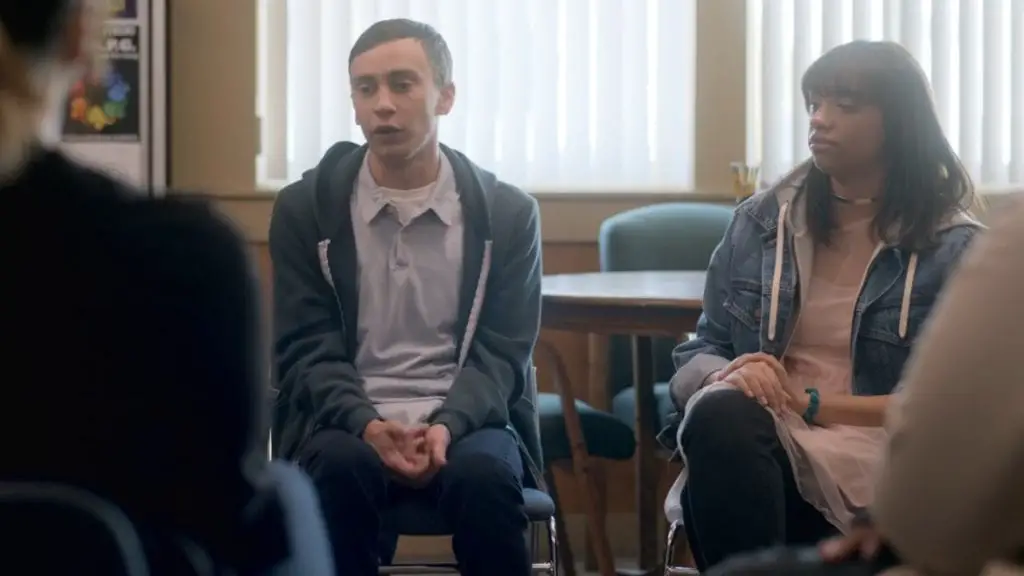
That being said, Atypical has always done very well at depicting certain facets of life on the spectrum. Sensory overload, especially. Creative shooting and editing choices allow them to hone in on certain things overwhelming Sam by making them just as grating to the viewer as they are to him. They do this with auditory stimuli a lot, turning up the volume on the irritating sound. Changing aspects of the visual scene to make them harsher is another trick they use. Though these techniques were more prominent in season one as they established the autistic character’s POV, they also used them in season two, like the time the classroom got too loud and Sam bolted and hid in the art supply closet. The one meltdown they’ve portrayed was particularly excellent, combining many of these strategies to make the viewer feel Sam’s panic as he got emotionally overwhelmed.
Another autistic characteristic Atypical portrays really well is discomfort with change and a need for control over one’s environment. One of the funnier sequences in season one was a chaotic series of cuts of Sam’s girlfriend Paige touching and picking up all the things in his room. People changing his environment or touching his stuff really grates on him. There was a poignant example of this is 2×01, when Casey started moving his toothbrush to weirder and weirder places to get a rise out of him. Her boyfriend Evan said maybe she should cut him a break, but she insisted that pestering Sam is her way of showing love. Unfortunately this ongoing prank overlapped with Sam finding out about his mother’s affair and the reason his father left the house, and that resulted in Sam throwing orange juice at Casey, who then threw punches at him.
(As much as I love Casey, Evan was right, she was being a jerk. Changing an autistic’s environment to get a reaction is a dick move. Few things upset me more, because not only is someone messing with my environment, I know they’re doing it because it upsets me and they find that funny.)
Similarly, there was a subplot this season about Sam’s inability to sleep in unfamiliar places, brought on by Paige asking him to accompany her to the senior lock-in. His coworker and wayward mentor Zahid proposed Sam sleep over to practice, and he did his best to make his room amenable to Sam’s needs. But there were things he missed, things a neurotypical may not even register, and this snowballed just like the incident with Paige until Sam decided to retreat to the comfort of his own room. In his peer group Sam found he is far from the only one who hates change. One girl said she would rather let all her teeth fall out than visit a new dentist. Relatable, dude.
Paige: It’s still nice to hear it from the horse’s mouth.
Sam: Is that an insult, or a phrase?
Finally, Sam’s difficulties with social cues and colloquial language are super relatable and well-portrayed. I know not everyone agrees with me, some people feel like they go over the top with this. That could be true, but… as much as I hate to admit it, I have said similarly stupid things as Sam has, things that would make me groan were I observing myself on TV. Sometimes in the moment, these things happen. The scene where Sam revealed the details of the Gardners’ intimate family drama unbidden to his guidance counselor felt over the top to me until I remembered a time I did something very similar as a teenager. Then I felt personally attacked.
The one time Atypical went too far with this was when Sam told Paige he didn’t love her in the season one finale. It wasn’t the fact that he said it, but that it was in public and he said it in such a detached way that felt really heartless. But the way Sam told Paige he loves her in the season two finale makes me feel better about how he told her he didn’t love her before. It was every bit as understated and detached, a conclusion he came to logically. It matches his understated grand gestures like jumping into the pool to retrieve Paige’s necklace (despite his hatred of pools) and giving her valedictorian speech for her (despise his paralyzing stage fright). He’s also amazing at getting very specific gifts for people’s needs and never acts like it’s a big deal, which is oddly charming.
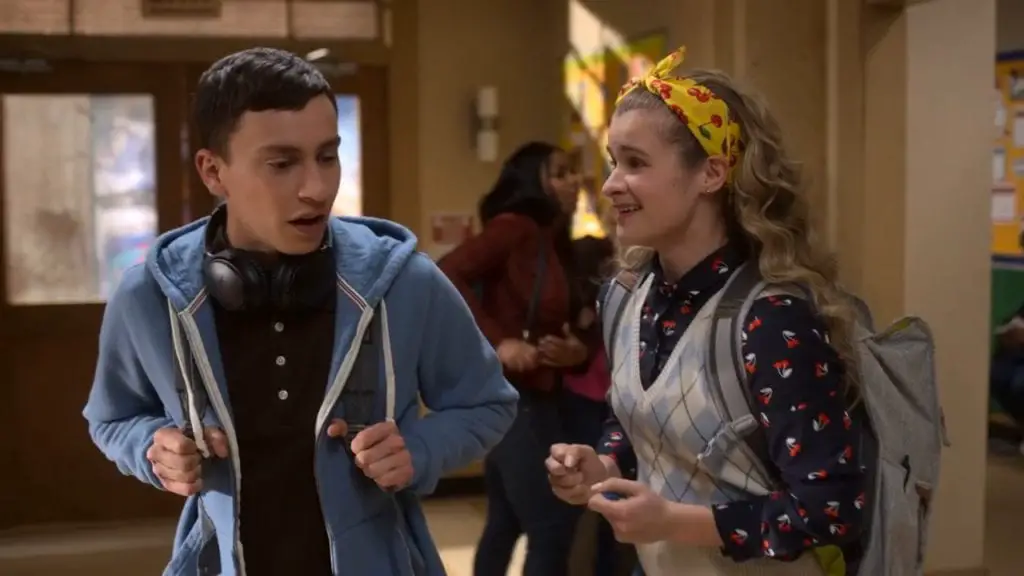
It’s becoming increasingly clear that Sam is simply straightforward and not about dramatics. That doesn’t make him cold or unfeeling, it just means he expresses his feelings differently than most people. And that’s not wrong, it’s just different. Also, Sam isn’t just a walking autistic stereotype in this way, despite what some people say. He does react appropriately to social cues sometimes, like when he told Paige he was sorry she didn’t make more money at her bake sale or when he expressed sympathy for Casey after Izzie friend-dumped her. The way he said those things still sounded a little vacant, but that doesn’t mean he meant them any less. Despite how it may look to some neurotypicals.
Similarly, Sam is easily manipulated because he has a hard time judging if other people are being sincere. He doesn’t know how to lie or detect a lie, there was a whole episode centered around that fact. Even after learning a technique for telling white lies, he still couldn’t tell when others were being insincere. He didn’t see that Arlo was using him when he asked for money for his party, didn’t detect the fake niceness or realize that someone like Arlo would definitely not make a house party penguin-themed in his honor. And as sad as that was, it was also… relatable. *sigh*
Family Dynamics
The ways the Gardners interact is honestly my favorite part of Atypical. I too come from a dysfunctional but loving family always willing to help each other out, so the Gardners give me a lot of laughs and feels. And in my humble opinion, Sam and Casey’s relationship is and always has been the highlight of the show. The good-natured teasing that instantly gives way to support when needed is really adorable and relatable. They have their genuine hostile moments, of course, including several door-slamming arguments and the physical altercation at the end of 2×01. But there’s also really sweet ones like when Casey snuggles up to watch a documentary with Sam and when he presents her with her annual birthday comic. Though they bicker all the time and have the occasional explosive fight, you can tell these two would do anything for each other.
One of the best microcosms of this dynamic came in 2×06, right after the family found out that Arlo cheated Sam out of $700 and broke his phone. Casey’s protective instincts kicked in full blast, and she and their father Doug agreed (facetiously) that Arlo needed to die. But when Sam told them to quiet down so he could listen to the first peeps of a recently hatched penguin chick, Casey sat on him like he was a penguin egg. The aftermath of their fight in 2×01 was also very sweet. The altercation was triggered in part by the toothbrush thing, so Casey got Sam a new one and put it in the right place. Sam, meanwhile, apologized via a gift of school supplies and said, “I’m your big brother. I can take care of you sometimes too.”
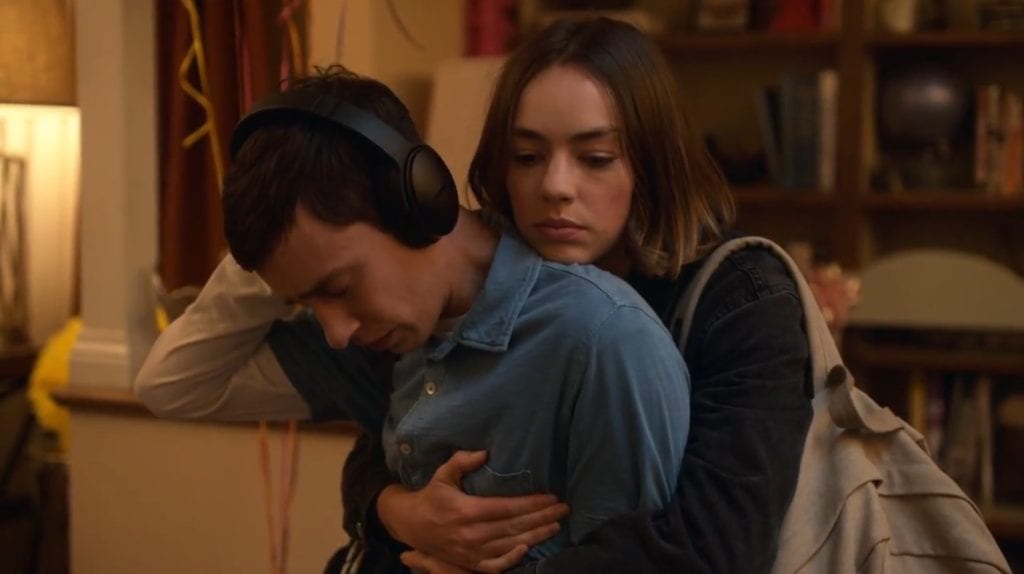
As Sam alluded to, their sibling dynamic is somewhat atypical despite its ubiquitous themes. Sam is older but leans on Casey for support because he’s prone to meltdowns and often bullied. Meanwhile, Casey is in the position of having to look out for her brother but is also the sibling who’s overshadowed by the kid who came before her. Thus, she has a mix of older and younger sibling traits: protectiveness and a jocular mean streak as well as petulance and attention-seeking behavior. Yet she’s mature for her age in many ways, the emotional rock to her easily rattled brother, and it’s easy to forget she’s only 15-16 in the first two seasons until she does something like lick Sam’s arm because he won’t get it out of her side of the car or write a passive-aggressive note about her mom’s affair on the family board.
The teenagers’ relationships with their parents are also delightful. Probably the healthiest pairing in the Gardner family is Doug and Casey. They’re less neurotic than Elsa and Sam and seem to have bonded over that. Well, that and how Casey is into sports, which Doug had expected to share with his son rather than his daughter. Their vibe oscillates between bros and father/daughter depending on the circumstances, and it’s a treat to watch. Doug’s one of the few people Casey can be vulnerable with, and they hands down have the best hugs.
Doug’s relationship with Sam has never been as close because they didn’t know how to bond with each other. In season one they finally connected over dating advice and Sam came to rely on Doug more than Elsa for the first time. It’s interesting because getting to know a parent you weren’t close to as a child actually does feel like this. There’s an awkward stage of feeling each other out and establishing trust, and satisfaction when you realize something went surprisingly well. Doug has continued to be supportive since, encouraging Sam to apply to colleges and join the peer group. It was hard to tell how much of that was Doug getting back at Elsa for her affair by contradicting her, but still, it seems Doug really does believe in his son and wants him to try to achieve more.
There’s also a thread to their relationship that is specific to children with special needs. Doug left the family for a while after Sam was diagnosed because he couldn’t handle it and didn’t think he was capable of parenting a kid on the spectrum. Then late in season one he realized he was still ashamed of Sam’s autism and decided to actively try to move past that. So the emotional crux of the Sam/Doug storyline this season was not a scene between the two of them, it was when Doug gave Arlo’s dad an earful for judging Sam and enabling his own son’s thoughtless behavior. That’s not something we would have seen before — in previous years Doug probably would have agreed that Sam was hard to be around and been embarrassed by it.
Doug: “[Sam] has autism. That’s a real thing, and I don’t think it’s something he or we should be punished for.”
Sam’s relationship with his mother is one we’ve definitely seen on screen before, the overprotective mom clinging to her child who is trying to grow up. But there’s an extra layer to it because Sam has special needs. Elsa is so used to being relied on so heavily, and for a longer time than normal, that when Sam decides to try to move forward in life it threatens this identity she has around being a mom, and specifically an autism mom. It also scares her because Sam had so many problems when he was younger, and she doesn’t want that to happen again if he tries to take on too much. Her doubts about his abilities could end up sabotaging him, though, and a large part of her arc is learning to let go and support Sam’s choices, even if they open him up to experiencing hardship or disappointment.
Meanwhile, Elsa’s relationship with Casey is ripe for comedy, but not at the expense of authenticity. The mom and teenage daughter dynamic is one of the most commonly explored in media, but this is one of the more relatable depictions I’ve seen. Much of that is because I too have a mother who tries too hard and sometimes overstepped in my teen years. God love Elsa, she just wants to be a good mom, but she’s so annoying. For the most part Casey isn’t any meaner to her than she is to Sam — apparently sarcasm and gentle bullying is how she shows affection. But their relationship took a really awful turn after Casey caught Elsa kissing Nick, and Casey spent most of this season proving Luisa was right when she said teenage girls are a-holes. Whether Elsa fully deserved it or not is up for debate.
Elsa: I don’t understand why you do all that working out if you’re not gonna flaunt your cute little figure.
Casey: Oh my god, mom. You want me to dress sluttier?
Elsa’s over-the-top efforts to make things better with the entire family were painfully awkward to watch, especially when it came to Casey. Like taking apart her blazer and altering it when she specifically asked her not to, or throwing her a big surprise birthday party when she’d said she just wanted to have a few friends over and keep it chill. But it was nice to see Elsa come to the realization that she and Sam had both made Casey’s birthday about them and what they wanted, not about her. Elsa sending everyone home after Casey flipped at her and Sam was one of her better character development moments. It’s up there with her apologizing to Sam for underestimating him and promising to support his college aspirations.
Speaking of that eventful party and its aftermath, my Elsa highlight this season was her awkward yet sweet speech to Casey in the finale about how she was intimate with a woman once. Elsa’s earnestness and Casey’s horror and humiliation were spot-on for that kind of situation. It’s very relatable to anyone with a mom who overshares or starts awkward conversations out of the blue. As funny as it was, it was also oddly touching. And it turned out to be reconciliatory, as much as Casey claimed it was one of the worst moments of her life.
A Queer Awakening
Okay, before getting into this, I’m going to take a moment to not-so-humble brag and say I KNEW it. Casey pinged my gaydar from the get-go, but I wasn’t sure Atypical would go there. Needless to say, I was pleasantly surprised when they decided to take her story this direction. Even better, the way they did it felt genuine and very specific to how teenage girls stumble upon their queerness. The intensity of female friendships at that age can obscure romantic feelings. Teenage boys are usually bad at expressing feelings or genuinely connecting thanks to toxic masculinity, so girls do all the emotional labor for each other and end up in quasi-romantic relationships with regularity.
Of course, there are those of us who experience this more strongly than others. It takes time to suss out that not all girls crave these bonds so intensely or get as emotionally invested as you do. (Time, or a hot girl who makes you go “Oh.”) Teenage girls can get really touchy-feely with each other, so two girls may be doing the exact same things but have totally different feelings and not realize it. Or, if you’re lucky, you both have those feelings and come to realize what they are.
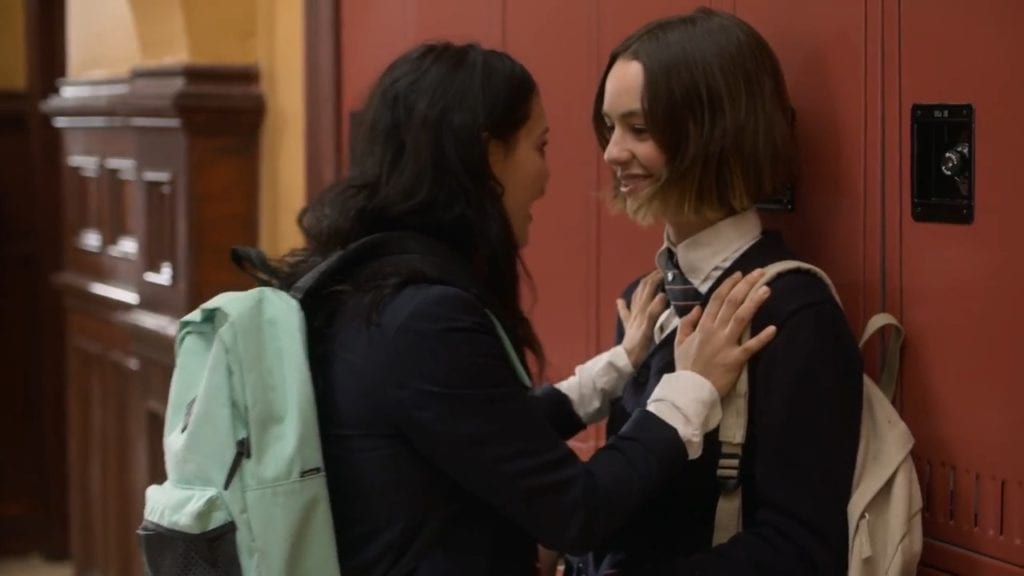
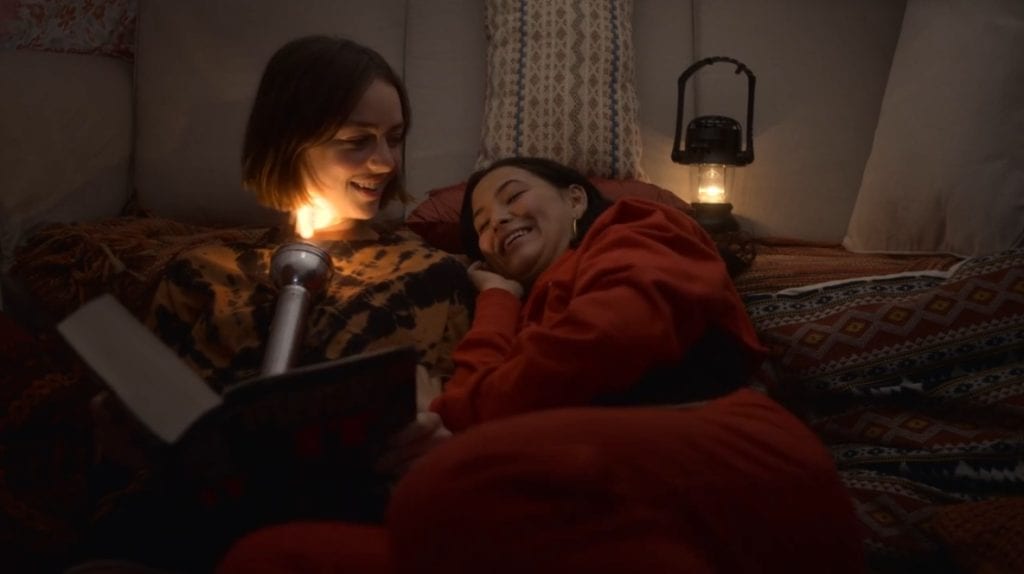
The feelings between Casey and Izzie were always intense. They went from butting heads and being extremely competitive with each other to an instantaneous strong connection once they realized how much they had in common. They relied on each other emotionally and were quite affectionate, especially Izzie. There were several moments when she unnecessarily touched Casey that pinged very gay, but Casey was certainly not complaining either. The intensity remained when things went downhill for them, too. Casey was anxious both before and after she told Izzie about how Nate kissed her, and despondent when Izzie pushed her away as a result. It was clear that losing Izzie was what Casey was most afraid of. And, as Izzie revealed at the birthday party, the same was true for her. It’s implied that she was afraid of getting hurt and pulled away first as a result. That’s definitely not unrealistic, either.
That brings us to the moment they almost kissed, which also came disguised as a platonic gesture. Izzie making up the forehead promise as an excuse to get close to Casey again was true to form, and also gave her an out if Casey responded in pure platonic fashion. That’s not to say I think Izzie planned to kiss her, because that’s unclear. But using teenage girl platonic affection as a way to get close to the girl you’re crushing on is something we’ve all done, whether we realized it or not.
I’m torn between being mad and relieved that Elsa interrupted before they actually locked lips. I totally ship this with my whole heart but I also adore Casey’s relationship with Evan. More importantly, Casey gave Elsa hell all season for her affair. If she were to cheat on her boyfriend now, it would be hypocritical. It’s probably for the best that this was left unresolved heading into season 3. Casey’s ambivalence in that last scene in the car is totally understandable. She truly loves Evan (who doesn’t, tbh?) but arguably has a stronger connection with Izzie. As she said, sometimes something just feels so right.
This storyline had a full-season arc, one it deserved. I’m very glad the writers gave this subplot room to breathe and develop naturally. But clearly there were hints of its development throughout the season. There were some jokes about it, too. In 2×01 Evan asked Casey if she was going to hide in the closet until graduation, to which she replied, “No.” They were talking about a literal closet, but still, nice foreshadowing. Then Izzie’s boyfriend Nate saw one of their touchy-feely moments and said he always knew they were going to fall in love. Finally, when Izzie saw Casey sticking a note in her locker she jokingly(?) asked if it was a love note.
Not only was it impeccably written, this storyline was impeccably acted. Brigette Lundy-Payne nailed every beat. The fact that she too is queer undoubtedly had something to do with it. Her ability to draw from her own experiences helped make this as good as it was, adding to the authenticity. That, her talent, and the top-notch writing she had to work with made her performance affecting, and frankly rather amazing. That’s not to forget Fivel Stewart, who was excellent too. The way she eyed up Casey, her reaction when Casey kissed Evan after they almost kissed, and all the subtle ways she threw in the physical affection combined to make her character’s queerness feel genuine.
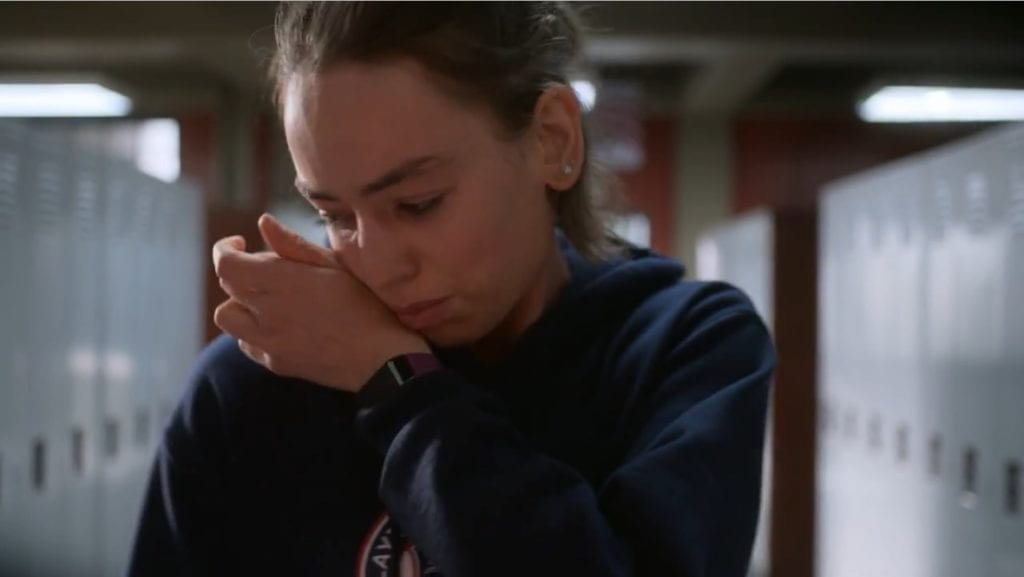
Really, it was the physicality of their acting that made it so believable. Yes, there was all that touching, but it’s not only that. One great example is the scene where Casey found “slut” and “ho” painted on her runners and tried to wash it off. There was no dialogue, and it wasn’t necessary. Though Casey was scrubbing the hell out of her shoes, the subtext suggested it wasn’t really about the shoes. She’d already been visibly upset about Izzie ending their friendship and calling her by her real name. But here, she broke down in one of her most vulnerable moments of the season as she tried and failed to at least fix one part of what had gone wrong. It was heartbreaking to watch as a fellow queer woman who has also been through the devastation of a friend break up that was really more than that.
Their scenes at the birthday party also incorporated some impressive physical acting. Casey’s reactions to Izzie showing up at the party and later knocking at her bedroom door were raw in a way that showed how painful the situation was for her, how much she both hated and missed Izzie at that moment. Then there was her dumbstruck ‘oh’ when she realized she was the person Izzie loved and was afraid to lose. Izzie, meanwhile, was clearly posturing when she first walked into both the house and the bedroom. Her disappointment when Casey ran off instead of greeting her and when Casey kissed Evan in front of her were palpable. The whole thing felt so very real, true to teenage girl angst.
The fact that this arc feels organic for Casey is extremely important to me. Sometimes a show will decide to make an existing character queer when they never vibed that way because they want to include queer representation. Or, they’ll introduce a new character whose only real trait and storyline is their queerness. Casey is neither of those, being an already established character with a myriad of interesting traits, one of which is her distinct queer vibe. I still wish there was a queer autistic character on the show, both because that represents me and because there are a lot of us and that should be acknowledged. But hey, an autistic and a queer jock in one family is a step closer, the two halves of the whole. I’ll take it, for now.
Stray Observations on Season Two
- Atypical still uses mostly person-first language rather than identity-first (person with autism vs. autistic person). Person-first has actually fallen out of favor with the autistic community at large. Many of us prefer to wield ‘autistic’ as an adjective and identifier than tack it on as something not to be focused on. Meanwhile, person-first tends to be favored by our guardians. There was a small plot beat about this last year when Doug (unwittingly) used identity-first language in Elsa’s parental support group and got chastised for it, but it was never really followed up on. It would be nice to see a conversation about this on the show to acknowledge that not everyone prefers the same language use.
- Zahid was much improved this season, evolving from his stereotypical misogynistic skirtchaser portrayal last year. He understands how Sam works and was able to make accommodations for him and help him cope with stressful situations, like in the police station. I think part of why he was tolerable this year was because Sam’s focus this season was not on finding a girlfriend, but on gaining independence. Thus, Zahid had more to do than give bad advice while constantly dehumanizing and objectifying women.
- I love the relationship between Evan and Elsa. Evan actually really likes his girlfriend’s mom, and it’s cute whenever he shows her kindness or plays devil’s advocate for her with Casey. Except for that time he called Casey a brat and she didn’t deserve it for once.
- It was cathartic to watch Julia slowly reintegrate into the Gardners’ lives in a healthy way after the explosive end to last season. I didn’t know how they were going to keep her relevant to the main plot this year, and bringing her back in via the first responder training was a smart way to do it.
- Sam and Paige going to bat for each other in the finale was heartwarming and really made me ship it. They are honestly the cutest, if rather dysfunctional at times.
All images courtesy of Netflix

